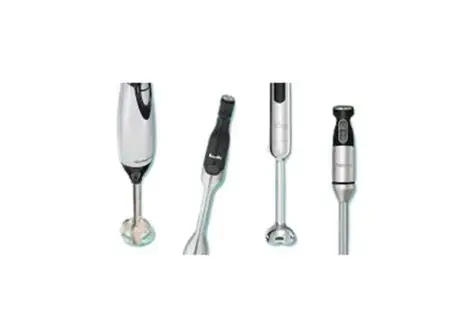Kitchen Appliances
Hand-held Blender
📌 Strategic Recommendations – Hand-held Blender IS 302 (Part 2/Section 14)
- Engage Early with BIS & Labs
Maintain BIS license validity and ensure regular safety testing. - Partner with Compliance Experts
Use expert support for documentation, labeling, and ongoing compliance. - Contact ERA Support Team
📧 cs@eraglobal.co.in | 📞 +91 9599296331 | 💬 WhatsApp — for BIS licensing and QCO support. - Track Notifications & Circulars
Subscribe to the ERA Newsletter for real-time updates on BIS circulars for updates on kitchen appliance safety standards. - Do a Gap Assessment
Check electrical safety, packaging, and labeling compliance against IS 302 (Part 2/Section 14).

| Section | Details |
|---|---|
| Product Name | Hand-held Blender |
| Applicable Indian Standard (IS) No. | IS 302 (Part 2/Section 14) |
| Title of Indian Standard | Safety of Household and Similar Electrical Appliances – Part 2: Particular Requirements, Section 14: Electric Kitchen Machines |
| Quality Control Order | Kitchen Appliances (Quality Control) Order, 2018 |
| Notification & Amendments | Notified via S.O. 5243(E), dated 10 October 2018 |
| Final Enforcement Date | 1 May 2019 |
| Objective & Scope | To ensure electrical safety and performance of hand-held blenders through mandatory BIS certification and adherence to IS 302 (Part 2/Section 14). |
| Products Covered | Hand-held blenders and similar domestic electric kitchen machines. |
| Exemptions | Products exclusively meant for export. |
| Industries Impacted | Kitchen Appliance Manufacturers, Electrical & Electronics Industry, Domestic Appliance Importers. |
| Mandatory Compliance | Conformity to IS 302 (Part 2/Section 14), ISI marking under BIS license (Scheme-I of BIS Regulations, 2018). |
| Next Steps for Stakeholders | Apply for BIS license, conduct safety testing in BIS-recognized labs, update packaging with ISI mark, ensure compliance before sale/import. |
| Legal Framework Provision & Enforcement | Enforced under BIS Act, 2016; BIS is the certification and enforcement authority. |
| Penalties for Non-Compliance | Punishable under BIS Act, 2016 – seizure, fines, license cancellation, or imprisonment. |
| Conclusion | Since May 2019, BIS certification is mandatory for hand-held blenders under IS 302 (Part 2/Section 14) to ensure consumer safety. |
| References / Annexures | QCO 2018: S.O. 5243(E), dated 10 October 2018 |
Ready to start your certification journey?
Let us help you navigate regulatory challenges and achieve certification with ease. Leave us your details, and we’ll get back to you—or request a free consultation today.
Get in touch with us today
Notification
Hand-held blenders were notified under the Kitchen Appliances (Quality Control) Order, 2018 via S.O. 5243(E), dated 10 October 2018, issued by the Ministry of Commerce & Industry under the BIS Act, 2016. This notification made it mandatory for all hand-held blenders sold, manufactured, or imported in India to conform to IS 302 (Part 2/Section 14). The Order was issued to ensure that domestic electrical kitchen appliances meet strict safety standards before reaching consumers.
Enforcement Timeline
The Order came into effect from 1 May 2019 and applied equally to domestic manufacturers and importers. From this date, no hand-held blender could be manufactured, imported, stored, sold, or distributed in India without a valid BIS license and ISI marking.
Overview
IS 302 (Part 2/Section 14) is a section of the broader IS 302 standard for electrical appliances, dealing specifically with particular safety requirements for electric kitchen machines, including hand-held blenders. The standard addresses hazards like electric shock, overheating, fire, mechanical risks, and insulation breakdown. It sets parameters for design, construction, and testing to minimize consumer risks during use.
Objective & Scope
The purpose of mandating IS 302 (Part 2/Section 14) certification is to safeguard consumer health and ensure consistent safety in electrical kitchen appliances. The scope covers safety aspects such as input power limits, abnormal operation, protection against access to live parts, durability of insulation, heating resistance, and proper labeling.
Products Covered
The Order applies to hand-held blenders and similar domestic electric kitchen appliances, whether manufactured in India or imported, intended for household or similar use.
Exemptions Provided
Only products manufactured exclusively for export are exempt from this requirement.
Industries Impacted
- Kitchen Appliance Manufacturers
- Electrical & Electronics Industry
- Importers, Distributors, and Retailers of Small Appliances
Mandatory Compliance Requirements
All hand-held blenders must conform to IS 302 (Part 2/Section 14), carry the ISI mark, and be certified by BIS under Scheme-I of the BIS (Conformity Assessment) Regulations, 2018. Manufacturers are required to undergo testing in BIS-recognized laboratories and obtain BIS licenses prior to marketing.
Next Steps for Stakeholders
Stakeholders must apply for BIS certification, ensure products are tested in BIS-approved labs, update packaging/marking with ISI, and maintain ongoing compliance for all new production.
Legal Provisions, Enforcement & Penalties
The BIS Act, 2016 empowers BIS to conduct inspections, seize non-compliant goods, and penalize offenders. Penalties for non-compliance include fines, suspension or cancellation of license, and imprisonment of up to 2 years.
Conclusion
Since 1 May 2019, BIS certification under IS 302 (Part 2/Section 14) has been mandatory for hand-held blenders. This ensures that every product in the Indian market complies with minimum safety standards, protecting consumers from electrical hazards and improving product reliability.
Ready to start your certification journey?
Let us help you navigate regulatory challenges and achieve certification with ease. Leave us your details, and we’ll get back to you—or request a free consultation today.
